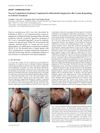 1 citations,
May 2015 in “Primary Health Care”
1 citations,
May 2015 in “Primary Health Care” Effective acne treatment varies by type, with topical and oral medications showing strong evidence, and patient education and support are crucial.
 February 2019 in “International journal of research in dermatology”
February 2019 in “International journal of research in dermatology” The combined treatments were highly effective for improving atrophic acne scars.
 January 2019 in “Elsevier eBooks”
January 2019 in “Elsevier eBooks” Different hair disorders have specific treatments and outcomes, with some resolving on their own and others requiring medication or emotional support.
 September 2018 in “The Medical Journal of Cairo University/The Medical Journal of Cairo University”
September 2018 in “The Medical Journal of Cairo University/The Medical Journal of Cairo University” Polarized light therapy helps hair regrowth in alopecia areata patients.
 September 2017 in “The journal of investigative dermatology/Journal of investigative dermatology”
September 2017 in “The journal of investigative dermatology/Journal of investigative dermatology” Blocking CCR5 can prevent and improve hair loss in alopecia areata.
 September 2017 in “The journal of investigative dermatology/Journal of investigative dermatology”
September 2017 in “The journal of investigative dermatology/Journal of investigative dermatology” Human hair follicles have a unique way of using energy and might use the Cori cycle; blocking CCR5 could help treat hair loss.
 February 2010 in “Facial Plastic Surgery Clinics of North America”
February 2010 in “Facial Plastic Surgery Clinics of North America” Tailoring facial plastic surgery to different ethnic groups ensures natural and satisfactory results.
 182 citations,
June 2017 in “Biomaterials”
182 citations,
June 2017 in “Biomaterials” Special fiber materials boost the healing properties of certain stem cells.
 86 citations,
July 2020 in “International Journal of Molecular Sciences”
86 citations,
July 2020 in “International Journal of Molecular Sciences” Activating the Wnt/β-catenin pathway could lead to new hair loss treatments.
 69 citations,
December 2016 in “Facial plastic surgery”
69 citations,
December 2016 in “Facial plastic surgery” Different types of facial fat affect aging and treatment outcomes; more research is needed to enhance anti-aging procedures.
 61 citations,
January 2019 in “American Journal of Clinical Dermatology”
61 citations,
January 2019 in “American Journal of Clinical Dermatology” The cause of Frontal Fibrosing Alopecia is unclear, diagnosis involves clinical evaluation and various treatments exist, but their effectiveness is uncertain.
 50 citations,
November 2010 in “Plastic and Reconstructive Surgery”
50 citations,
November 2010 in “Plastic and Reconstructive Surgery” Botox increased hair count in men with baldness and might work by improving scalp blood flow.
 48 citations,
September 2017 in “Frontiers in Bioscience”
48 citations,
September 2017 in “Frontiers in Bioscience” Nanoparticles show promise for better wound healing, but more research is needed to ensure safety and effectiveness.
 43 citations,
November 2007 in “Dermatologic Clinics”
43 citations,
November 2007 in “Dermatologic Clinics” Hair and nail changes can indicate health issues, including cancer and side effects from cancer treatments.
 42 citations,
December 2014 in “Clinical, cosmetic and investigational dermatology”
42 citations,
December 2014 in “Clinical, cosmetic and investigational dermatology” Nonablative radiofrequency treatments, especially microneedle and fractional types, can improve acne scars by 25%–75% after 3-4 sessions, with full results in 3 months and some side effects.
 37 citations,
April 2013 in “Plastic and Reconstructive Surgery”
37 citations,
April 2013 in “Plastic and Reconstructive Surgery” Genetic and environmental factors, like smoking and exercise, affect male hair loss.
 35 citations,
October 2017 in “Trends in Molecular Medicine”
35 citations,
October 2017 in “Trends in Molecular Medicine” Mice with enhanced regeneration abilities may help develop new regenerative medicine therapies.
 32 citations,
September 2017 in “Journal of the American Academy of Dermatology”
32 citations,
September 2017 in “Journal of the American Academy of Dermatology” Oral isotretinoin effectively treats yellow facial papules in frontal fibrosing alopecia patients.
 28 citations,
November 2008 in “Facial Plastic Surgery”
28 citations,
November 2008 in “Facial Plastic Surgery” Follicular Unit Transplantation (FUT) can give great results and patient satisfaction when done carefully and by a skilled surgeon.
 23 citations,
October 2018 in “Expert Opinion on Drug Safety”
23 citations,
October 2018 in “Expert Opinion on Drug Safety” Consider benefits and risks of new alopecia treatments for safety.
 20 citations,
December 2016 in “American Journal of Clinical Dermatology”
20 citations,
December 2016 in “American Journal of Clinical Dermatology” Men prefer less invasive cosmetic procedures and need different treatment approaches than women.
 17 citations,
January 2015 in “Current problems in dermatology”
17 citations,
January 2015 in “Current problems in dermatology” Understanding and treating hair disorders in different ethnic groups requires knowledge of specific hair care practices and hair characteristics.
 17 citations,
October 2002 in “Dermatologic Surgery”
17 citations,
October 2002 in “Dermatologic Surgery” Successful surgical hair restoration requires careful planning, precise execution, and proper aftercare, using techniques like follicular unit transplantation and correct hair angling for best cosmetic results.
 15 citations,
July 2020 in “Stem Cell Research & Therapy”
15 citations,
July 2020 in “Stem Cell Research & Therapy” Stem cell therapy helps heal burn wounds, especially second-degree burns, by promoting blood vessel growth and reducing inflammation.
 15 citations,
March 2015 in “Facial plastic surgery”
15 citations,
March 2015 in “Facial plastic surgery” The article compares different products for rejuvenating the upper part of the face.
 14 citations,
January 2015 in “Acta dermato-venereologica”
14 citations,
January 2015 in “Acta dermato-venereologica” Acitretin significantly reduced inflammatory attacks in a woman with Naevus Comedonicus Syndrome but caused side effects.
 11 citations,
February 2003 in “Baillière's best practice & research. Clinical obstetrics & gynaecology/Baillière's best practice and research in clinical obstetrics and gynaecology”
11 citations,
February 2003 in “Baillière's best practice & research. Clinical obstetrics & gynaecology/Baillière's best practice and research in clinical obstetrics and gynaecology” Acne and increased body hair in teenage girls are normal but severe cases may need hormone evaluation and treatment can prevent diabetes linked to PCO.
 11 citations,
January 2002 in “Dermatologic Surgery”
11 citations,
January 2002 in “Dermatologic Surgery” Using minoxidil before and after facelift surgery can effectively prevent temporary hair loss without causing other complications.
 7 citations,
July 2014 in “Facial Plastic Surgery Clinics of North America”
7 citations,
July 2014 in “Facial Plastic Surgery Clinics of North America” Different ethnic hair traits must be considered for successful hair restoration surgery to achieve natural-looking results.
 2 citations,
April 1999 in “Dermatologic Clinics”
2 citations,
April 1999 in “Dermatologic Clinics” The paper concludes that creating a natural-looking hairline in hair restoration is important for facial aesthetics and involves careful planning and realistic expectations.






























